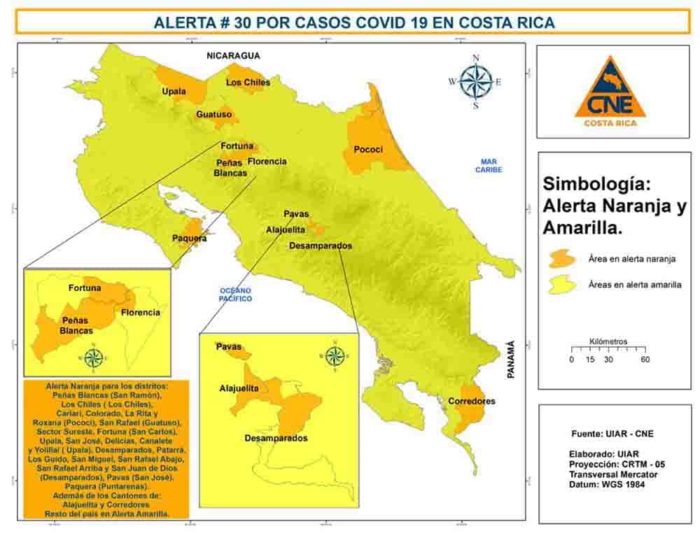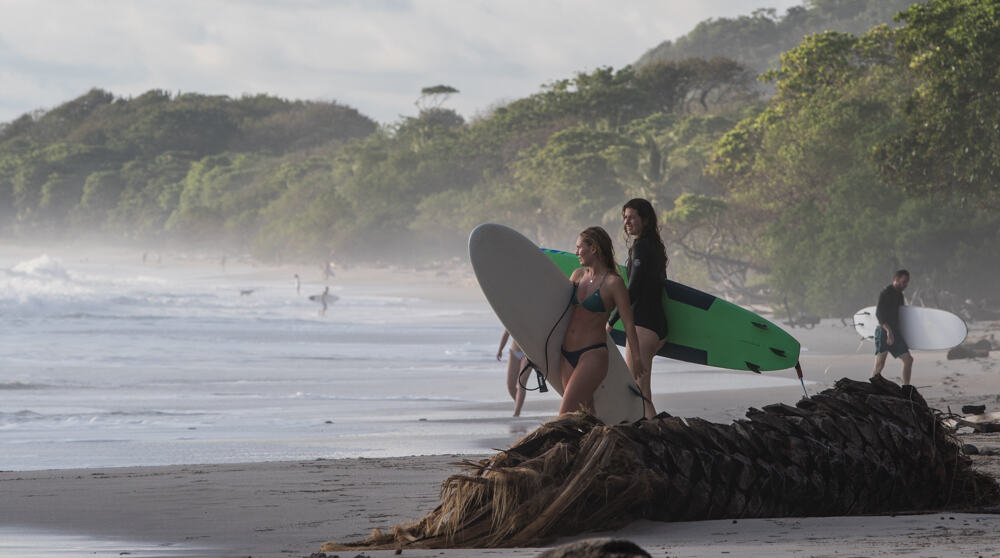Costa Rica continues easing coronavirus restrictions.
Here’s what’s open (and what isn’t) in the majority of Costa Rica as of June 27, 2020. There are some regional exceptions; scroll to the end for more information.
Beaches and National Parks
The nation’s beaches are open every day from 5 a.m. to 9:30 a.m. All visitors should practice physical distancing between themselves and others who are not part of their social circle.
Costa Rica originally hoped to reopen beaches at all hours in mid-July; we don’t know for what date this is now planned. Some beach communities protested this week demanding extended beach hours, arguing that they need the economic stimulus it would provoke.
Costa Rica has reopened 28 national parks and protected wildlife areas, including several of the country’s most popular destinations. The full list is available here. Not all attractions or sectors at these parks have reopened.
Hotels and businesses
Hotels and restaurants can operate at 50% capacity, including on the weekends.
Commercial centers, most stores and museums can now operate both during the week and on the weekend with capacity restrictions. Gyms, swim schools and art academies can also remain open throughout the week. Prior reservation may be required for some businesses.
Bars must remain closed.
Mass events and religious gatherings
Places of worship (e.g. churches) can hold services with capacity limits and distance guidelines.
Event halls can host gatherings of up to 30 people.
Other mass gathering events (e.g. concerts, sports with fans) remain suspended for the foreseeable future.
The Education Ministry is still formulating guidelines for the return of in-person teaching, which could tentatively occur in August.
International and domestic travel
Costa Rica is currently enforcing driving restrictions nationwide. These include nighttime restrictions (10 p.m.-5 a.m. on weeknights; 7 p.m.-5 a.m. on weekends), plus daytime restrictions based on the last digit of the vehicle’s license plate.
The expectation is that these driving restrictions will remain until at least August 1. La Restricción is a handy tool to visualize the restriction for your vehicle.
Authorities are also enforcing stricter regional restrictions in some cantons and districts.
Costa Rica will begin welcoming foreign visitors on August 1. Tourists will be allowed only from countries with controlled coronavirus transmission, and must abide with other contact-tracing measures. That protocol and the list of allowed countries will be announced in July.
Costa Rican citizens are permitted to enter the country. Non-citizen residents who last left the country on or before March 24 can also enter Costa Rica. All must isolate at home for 14 days.
All ongoing repatriation flights operate from Juan Santamaría International Airport near San José. The airport’s expectation of when airlines will resume operations is linked here.
Exceptions to reopening plans
Excluded from this “Phase 3” reopening are all areas under an Orange Alert and select at-risk areas.
Orange Alert: For areas under orange alerts, as pictured below, commercial businesses can only operate from 5 a.m. – 5 p.m. on weekdays. (Supermarkets, health centers and pharmacies are among the exceptions and can also operate on the weekend.)
The weeknight driving restriction begins at 5 p.m., compared to 10 p.m. in the rest of the country.

Remain in Phase 2: These at-risk areas remain in “Phase 2.” Here, some commercial businesses (general stores, theaters, museums) must remain closed on weekends, and religious ceremonies aren’t allowed.
However, the weeknight driving restriction in these areas is from 10 p.m. to 5 a.m.
- Ulloa (Heredia), La Uruca, La Merced, Hospital, Hatillo, Mata Redonda, Catedral, Zapote, San Rafael de Escazú, Curridabat, San Francisco de Dos Ríos, San Sebastián, Aserrí, San Gabriel, Corralillo (Cartago).
Here is the official communication on the exceptions from President Carlos Alvarado:
A partir de mañana avanzamos a la fase 3 de apertura, con la excepción de las zonas en alerta naranja y algunos cantones y distritos con riesgo incrementado. Los resultados de la fase 3 dependerán del estricto cumplimiento de los protocolos sanitarios. No podemos bajar la guardia pic.twitter.com/nJFszwa1Vi
— Carlos Alvarado Quesada (@CarlosAlvQ) June 27, 2020
Mask requirements enforced
Masks or face shields are required in many public situations as follows:
- For any worker attending to the public (e.g. waiters, bank tellers, drivers of paid public transport). If a business has a physical barrier made of glass, acrylics or polyethylenes installed between the worker and the public, face coverings are not required.
- For clients and drivers of paid public transport (e.g. buses, taxis). Masks are recommended, but not required, at bus stops.
- For officiants and guests at religious services.
- For clients at theaters and cinemas.
- For anyone visiting a health center, prison, drug or alcohol treatment center, or centers caring for at-risk populations.
- For caretakers attending to the elderly or those with disabilities, especially at nursing homes or residential alternatives.
- For call-center workers who share cubicles.
- For customers at banks.
Masks do not replace other physical distancing and cleanliness measures. You may be denied entry into an establishment if you are not wearing a mask.






